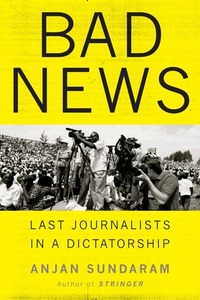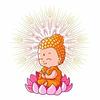Take a photo of a barcode or cover
Sundaram describes the program he ran for journalists in Kigali, and over the course of the book, the program gradually becomes less and less effective. Journalists are afraid to report, those who even seem to hint at criticism of the government are harassed, jailed, threatened and their families and neighbors reject them. This is a completely different image of Paul Kagame than the one that comes through in Gourevitch's We wish to inform you. Sundaram's metaphor for how to see the repression in Rwanda is to look at what's missing, but it's perhaps a testament to how successful the repression is that even while reading I wondered about the conclusions he was drawing...how could this be true? He paints a picture of a society steadily moving towards a single voice, the voice of the government, even to the extent that people betray loved ones or take actions that hurt themselves.
Temat w sumie ciekawy, o którym nie mówi się zbyt wiele, ale nie jest to mój typ książki. Bardziej niż reportaż na temat samego zjawiska są to wspomnienia autora i opis jego doświadczeń- spodziewałem się czegoś złożonego, może dodatkowych analiz, listy źródeł i tekstów uzupełniających, ale niestety tego nie dotrzymałem. Za to jak na opis konkretnych wydarzeń jest tu trochę zbyt ogólnie, brak opisów miejsc, ludzi, a umiejscowienie w czasie zajęło mi chwilę. Plus jest taki, że czytało się dobrze, ale to chyba nie wystarczyło.
It’s sad that such dictatorships are still prevalent in our world and how freedom of speech is threatened. What’s even more distressing is the way Western nations and world organisations turn a blind eye on what it’s happening in less developed nations and how they support the corrupt and autocratic governments despite of notorious warnings from journalists which are eventually killed or forced to flee the country.
The piece that struck me most is when author sees the huts’ roofs destroyed by the government’s order.
“The man said the local authorities had come to the village and told the people to destroy their roofs. It was an order (…) And what did this man think? “They are too primitive,” he said. “Our country is modern now”.
The power of social influence, governmental influence not only on explicit but also implicit attitudes of the citizens is striking. And this isn’t how life in a country supported by United Nations should look like.
The piece that struck me most is when author sees the huts’ roofs destroyed by the government’s order.
“The man said the local authorities had come to the village and told the people to destroy their roofs. It was an order (…) And what did this man think? “They are too primitive,” he said. “Our country is modern now”.
The power of social influence, governmental influence not only on explicit but also implicit attitudes of the citizens is striking. And this isn’t how life in a country supported by United Nations should look like.
challenging
dark
reflective
medium-paced
Very compelling and hard to put down. Chronicles life in a dictatorship in the 21st century.
Paul Kagame's personality cult is so in control that one of the only ways to criticize him is to offer outlandish praise.
Maybe not as brutal as what you hear in similar stories out of North Korea (though there is the practice of kufaniya, the killing of child soldiers so you can't be prosecuted for using them) but it's all the more chilling because the international aid community is completely aware of what's happening, and propping the system up.
Paul Kagame's personality cult is so in control that one of the only ways to criticize him is to offer outlandish praise.
Maybe not as brutal as what you hear in similar stories out of North Korea (though there is the practice of kufaniya, the killing of child soldiers so you can't be prosecuted for using them) but it's all the more chilling because the international aid community is completely aware of what's happening, and propping the system up.
Read Harder Challenge #5: A book by a journalist or about journalism.
Although the subject matter - the repression of the press in Rwanda after the genocide, and government control of the people more generally - is fascinating and timely, something about the writing style made this book a little difficult to get through. Worth the effort, though.
Although the subject matter - the repression of the press in Rwanda after the genocide, and government control of the people more generally - is fascinating and timely, something about the writing style made this book a little difficult to get through. Worth the effort, though.
Since the book is written by a journalist the writing is to the point and brings across all the issues without getting too much into the authors emotions and personal struggles.
With nonfiction even sometimes it can be a bit personal and only about the author and how he experienced something , but rather than making it about his experience alone it really felt universal for the country Rwanda and the whole population there.
I think its fascinating to see how dictatorships work and what the consequences for the people are and also how other contries are complicit with the situation and even advancing it when they don't have other interests that would drive them to intervene or at least stop the funding.
It is difficult to imagine that this is real life for someone and being denied basic human rights is something I hopefully will never have to experience that way.
With nonfiction even sometimes it can be a bit personal and only about the author and how he experienced something , but rather than making it about his experience alone it really felt universal for the country Rwanda and the whole population there.
I think its fascinating to see how dictatorships work and what the consequences for the people are and also how other contries are complicit with the situation and even advancing it when they don't have other interests that would drive them to intervene or at least stop the funding.
It is difficult to imagine that this is real life for someone and being denied basic human rights is something I hopefully will never have to experience that way.
Finally decided to give it 3 rather than 4 stars. It's a compelling read for sure: Sundaram knows how to write and draw a reader in. He provides a chilling account of how free press and media are increasingly shut down in Rwanda and how the international community does nothing. In that respect I thought the book was very interesting, well written and I had difficulty putting it down.
However, as an advocate of professional journalism, I found it strange that Sundaram chose not to provide any sources. Particularly for sections that give a more historical account of Rwanda, its 1994 genocide and Kagame's advent to power. Now it felt as a sometimes overly subjective account and, having read a bit more on Rwanda in other books, I sometimes questioned what - or better how - Sundaram chose to describe certain historical developments. But I suppose that the lack of sources is perhaps more reflective of the type of book, which I would describe as memoires/an accessible read rather than hard non-fiction, than of a lack of professionalism.
Sometimes a bit too focused on the author himself, the book is nonetheless a worthy testament to those journalists who tried to resist the regime.
However, as an advocate of professional journalism, I found it strange that Sundaram chose not to provide any sources. Particularly for sections that give a more historical account of Rwanda, its 1994 genocide and Kagame's advent to power. Now it felt as a sometimes overly subjective account and, having read a bit more on Rwanda in other books, I sometimes questioned what - or better how - Sundaram chose to describe certain historical developments. But I suppose that the lack of sources is perhaps more reflective of the type of book, which I would describe as memoires/an accessible read rather than hard non-fiction, than of a lack of professionalism.
Sometimes a bit too focused on the author himself, the book is nonetheless a worthy testament to those journalists who tried to resist the regime.



